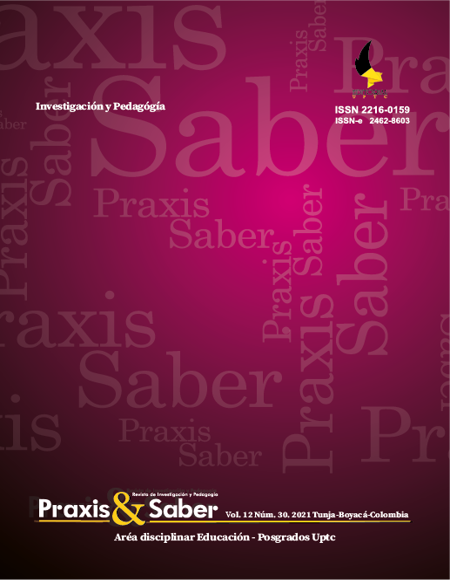Shipibo-Conibo kenebo and the notion of topological space in 5-year-old children

Abstract
For the Shipibo-Conibo, the view of the designs—or “kenebo”—is fundamental to understanding their relationship with the natural, the spiritual, and the notion of their being in space and time. For some authors, the notion of space (NS) in pre-school children improves over time and depends on the environment. The aim of the study is to determine the
influence of the Shipibo-Conibo designs on the NS in pre-school children. Methodologically, the research is quantitative, applied, descriptive, and experimental. The sample consisted of 48 children from two educational institutions in Yarinacocha, Ucayali, Peru, in 2019. Two groups of 24 children—control and experimental—were formed. The latter was intervened with workshops on Shipibo-Conibo kenebos and with an observation guide. The competence score on the NS was measured in each group, with an experimental design and pre- and posttests. The statistical analysis was descriptive and inferential, based on measures of both central
tendency and of dispersion. For the comparison of medians, the Mann-Whitney U test was used. For the analysis of differences between the distributions of scores, the Kolmogorov-Smirnov test was used. The results found that the intervention was effective. It is concluded that the Shipibo-Conibo kenebo had a significant influence on the abilities related to the NS.
Keywords
intercultural education, educational workshop, space, pedagogy, kenebo, Shipibo-Conibo
References
- Aponte, R. (2015). El taller como estrategia metodológica para estimular la investigación en el proceso de enseñanza-aprendizaje en la educación superior. Boletín Virtual, 4(10), 49-55. https://dialnet.unirioja.es/servlet/articulo?codigo=6232367
- Belaunde, L. (2009). Kené: arte, ciencia y tradición en diseño. Instituto Nacional de Cultura.
- Belaunde, L. (2012). Diseños materiales e inmateriales: la patrimonialización del kené
- shipibo-konibo y de la ayahuasca en el Perú. Mundo Amazónico, 3, 123-146. https://revistas.unal.edu.co/index.php/imanimundo/article/view/28715
- Brabec, B., & Mori, L. (2009). La corona de la inspiración. Los diseños geométricos de los
- Shipibo-Konibo y sus relaciones con cosmovisión y música. Indiana, (26), 105-134. https://journals.iai.spk-berlin.de/index.php/indiana/article/view/1969
- Cabrera, G., Zanazzi, J., Zanazzi, J., & Boaglio, L. (2017). Comparación de potencias en pruebas estadísticas de normalidad, con datos escasos. Revista de la Facultad de Ciencias Exactas, Físicas y Naturales, 4(2), 47-52. https://revistas.unc.edu.ar/index.php/FCEFyN/article/view/16775
- Castro, J. (2004). El desarrollo de la noción de espacio en el niño de Educación Inicial.
- Acción Pedagógica, 13(2), 162-170. https://n9.cl/uyrf1
- Cépeda, N., Castro, D., & Lamas, P. (2019). Concepciones de interculturalidad y práctica en aula: estudio con maestros de comunidades shipibas en el Perú. Educación, 28(54), 61-86. http://dx.doi.org/10.18800/educacion.201901.004 DOI: https://doi.org/10.18800/educacion.201901.004
- Delgado, G. (2017). El malestar en la cultura shipibo-konibo [Tesis doctoral, Universidad
- Complutense de Madrid]. E-Prints Complutense. https://eprints.ucm.es/id/
- eprint/43274/1/T38923.pdf
- Espino, G. (2018). Literatura indígena amazónica shipibo-conibo y el kené de la palabra de Lastenia Canayo. Estudios Filológicos, 62, 247-267. http://dx.doi.org/10.4067/S0071- DOI: https://doi.org/10.4067/S0071-17132018000200247
- Fernández, J., & Ramiro, E. (2015). El concepto espacio en educación infantil [Trabajo final de grado, Universitat Jaume I]. Repositori Universitat Jaume I. http://repositori.uji.es/xmlui/handle/10234/159051
- García, M., Villegas, M., & González, F. (2015). La noción del espacio en la primera infancia: un análisis desde los dibujos infantiles. Revista Paradigma, 36(2), 225-245. http://ve.scielo.org/pdf/pdg/v36n2/art11.pdf
- González, P. (2016). La tradición de arte chamánico shipibo-conibo (Amazonía peruana) y su relación con la cultura diaguita chilena. Boletín del Museo Chileno de Arte Precolombino,
- (1), 27-47. https://dx.doi.org/10.4067/S0718-68942016000100003 DOI: https://doi.org/10.4067/S0718-68942016000100003
- Gutiérrez, D. (2009). El taller como estrategia didáctica. Razón y Palabra, 66, 1-4. http://www.redalyc.org/articulo.oa?id=199520908023
- López, I., San Pedro, B., San Pedro, J., & González, C. (2016). Enseñar dibujo y
- representación espacial en los estudios de grado en Educación Infantil y Primaria desde la Educación Artística. Revista de Psicología y Educación, 11(1), 61-80. http://www.
- revistadepsicologiayeducacion.es/pdf/136.pdf
- Mansilla, J. (2019). Olivia Arévalo Lomas: una ventana desde el infinito asesinato del canto sagrado Shipibo-Konibo-Xeteba. Revista Historia de la Educación Latinoamericana, 21(33), 17-34. https://doi.org/10.19053/01227238.9909 DOI: https://doi.org/10.19053/01227238.9909
- Mendivel, R., Arias, J., & Aguilar, R. (2016). Estrategia didáctica basada en cantos shipibos para recuperar la lengua shipibo-konibo en niños de Educación Inicial, Ucayali. Apuntes de Ciencia y Sociedad, 6(2), 143-149. http://dx.doi.org/10.18259/acs.2016023 DOI: https://doi.org/10.18259/acs.2016023
- Monteluisa, G., Valera, V., Frisancho, F., Frech, H., & Delgado, E. (2015). Non Tsinitibo: juegos del pueblo shipibo-konibo y su uso pedagógico. Educación, 24(47), 49-68. http://revistas.pucp.edu.pe/index.php/educacion/article/view/14241 DOI: https://doi.org/10.18800/educacion.201502.003
- Morales, D., & Mujica, A. (2019). La arqueología y el mito de origen de los shipibo-conibo de la Amazonía peruana. Investigaciones Sociales, 22(40), 85-96. http://dx.doi.org/10.15381/is.v22i40.15888 DOI: https://doi.org/10.15381/is.v22i40.15888
- Morales, E. (2014). Espacio educativo de aprendizaje para el nivel inicial [Informe previo a Licenciatura, Universidad Rafael Landívar]. Crai Landívar Red de Bibliotecas. http://biblio3.url.edu.gt/Tesario/2014/05/84/Morales-Eugenia2.pdf
- Odland, J., & Feldman, N. (2010, 1 de enero). Shipibo textile practices 1950-2010 [Conferencia]. Textile Society of America Symposium Proceedings. University of Nebraska-Lincoln, Nebraska, Estados Unidos.
- Piaget, J. (1985). Epistemología y psicología. Planeta DeAgostini.
- Rimassa, C., & Fernández-Silva, S. (2014). Conceptualización del espacio y su relación con el desarrollo cognitivo: un estudio piloto en el español de Chile. Alpha (Osorno), 38, 137-
- http://dx.doi.org/10.4067/S0718-22012014000100010 DOI: https://doi.org/10.4067/S0718-22012014000100010
- Sánchez, J., & Benítez, J. (2014). Nociones espacio-temporales y bimodal: análisis de
- una implementación educativa para alumnado de 3 años. International Journal of Developmental and Educational Psychology, 3(1), 165-177. https://www.redalyc.org/
- pdf/3498/349851785017.pdf
- Suárez, R. (2018, 09-12 de diciembre). El proceso de enseñanza /aprendizaje mediados por las iconografías del pueblo shipibo-conibo [Ponencia]. 31ª Reunião Brasileira de Antropologia, Universidade de Brasília, Brasília/DF, Brasil.
- Vargas, J. (2018). 87 años de educación inicial en el Perú. https://departamento.pucp.edu.pe/
- educacion/noticias/87-anos-educacion-inicial-peru/
- Villegas, M., Medina, M., García, M., & González, F. (2013, 16-18 de octubre). Las nociones espaciales en educación infantil. Un estudio diagnóstico [Conferencia]. VI Congresso Internacional de Ensino da Matemática, Canoas, Brasil.
- Weist, R. (2002). Temporal and spatial concepts in child language: conventional and configurational. Journal of Psycholinguistic Research, 31, 195-210. https://doi.org/10.1023/A:1015522711549 DOI: https://doi.org/10.1023/A:1015522711549
